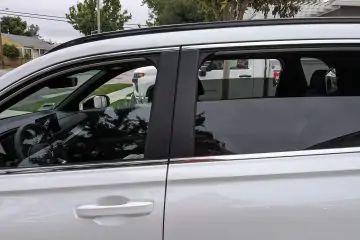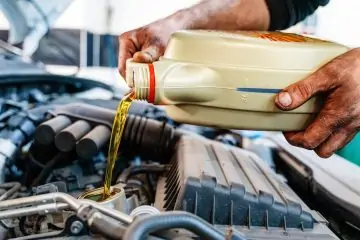Your Jeep fan might be running loudly due to a faulty fan clutch or a blocked radiator. These issues can cause the fan to operate at high speed continuously.
A loud fan in your Jeep can be both annoying and concerning. It often signals underlying problems that require attention. The fan is crucial for cooling the engine, preventing overheating, and ensuring optimal performance. A faulty fan clutch, for example, can cause the fan to run at high speeds unnecessarily, leading to excessive noise.
Similarly, a blocked radiator can impede airflow, forcing the fan to work harder. Addressing these issues promptly can help maintain your Jeep’s health and improve your driving experience. Regular maintenance and timely inspections can prevent these problems from escalating.
Introduction To Jeep Fan Noise Issues
Have you ever wondered why your Jeep fan is so loud? Many Jeep owners face this issue. A loud cooling fan can be annoying. But it is also a sign of something important.
Common Complaints About Jeep Fan Noise
Many Jeep owners have shared their concerns. Here are some common complaints:
- The fan runs loudly, even when the engine is cold.
- The noise gets worse in hot weather.
- The fan keeps running after the engine is off.
Purpose Of The Cooling Fan In Jeeps
The cooling fan has an important job. It keeps the engine from overheating. Here are some key points:
- Cools the engine: The fan cools the engine by blowing air.
- Helps the radiator: It helps the radiator cool the engine coolant.
- Runs based on temperature: The fan starts when the engine gets hot.

Credit: www.reddit.com
Identifying The Types Of Fan Noises
Understanding the different sounds your Jeep fan makes is crucial. This knowledge helps in identifying potential issues and ensuring your vehicle runs smoothly. Here, we will delve into the various types of fan noises and how to identify them.
Distinguishing Between Normal And Abnormal Fan Sounds
Normal fan sounds are usually consistent and smooth. They indicate that the fan is operating correctly. Pay attention to the following characteristics:
- Consistent humming: A steady, low noise is typical.
- Whirring sound: A gentle whirring as the fan speeds up is normal.
Abnormal fan sounds are often louder and more erratic. These noises can signal potential issues. Look out for:
- Grinding or rattling: This could indicate a loose or damaged fan blade.
- Squealing: A high-pitched squeal often points to a worn-out belt.
Characteristics Of Concerning Fan Noises
Concerning fan noises often have distinct characteristics. Identifying these can prevent further damage.
| Noise Type | Possible Issue |
|---|---|
| Grinding | May indicate worn bearings. |
| Rattling | Could be a loose fan blade. |
| Squealing | Often a sign of a slipping belt. |
| Hissing | Potential coolant leak nearby. |
It’s crucial to address these noises promptly. Ignoring them can lead to further damage and costly repairs.
Potential Causes Of Loud Fan Operation
Jeep owners often face a loud fan operation issue. This can be annoying. Understanding the reasons behind this noise helps in fixing it. Here are some potential causes of loud fan operation in your Jeep.
Faulty Fan Clutch Leading To Noise Escalation
The fan clutch helps control the fan speed. If it fails, the fan may run too fast. This causes a loud noise. A worn-out fan clutch can’t regulate the fan speed. It may need a replacement.
Check the fan clutch if you hear excessive noise. A simple inspection can reveal if it’s the problem. Replace it to restore normal fan operation.
Debris And Obstructions In The Fan Assembly
Debris can get stuck in the fan assembly. This makes the fan work harder. The result is a loud noise. Regular cleaning of the fan assembly can prevent this issue.
Inspect the fan for any obstructions. Remove any debris you find. This will help reduce the noise. Keeping the fan assembly clean ensures smooth operation.
Impact Of Overheating On Fan Noise
Have you noticed your Jeep’s fan running loudly? The root cause could be overheating. Overheating impacts fan noise directly. This can indicate underlying issues with the engine’s cooling system.
How Engine Temperature Affects Fan Speed
The engine’s temperature plays a crucial role in fan speed. As engine heat rises, the fan works harder to cool it. This results in a loud noise. The fan’s increased speed combats the heat.
Here is how engine temperature affects fan speed:
- Normal Temperature: Fan runs at a low speed, producing minimal noise.
- High Temperature: Fan runs at a high speed, causing loud noise.
The Role Of The Thermostat In Fan Control
The thermostat regulates the engine’s temperature. It decides when the fan should start or stop. If the thermostat fails, it impacts fan operation.
Here is a simple table explaining the thermostat’s role:
| Condition | Thermostat Action | Fan Response |
|---|---|---|
| Engine Cold | Thermostat Closed | Fan Off |
| Engine Warm | Thermostat Opens | Fan On |
| Thermostat Failure | Remains Closed or Open | Fan Runs Continuously |
A faulty thermostat can cause the fan to run loudly. Ensure it functions correctly to maintain optimal fan noise levels.
Electrical Issues And Fan Loudness
Is your Jeep’s fan running loudly? Electrical issues can often be the cause. Understanding these can help you fix the problem.
Faulty Wiring And Its Effect On Fan Operation
Faulty wiring can cause your Jeep’s fan to run loudly. Broken or damaged wires may create high resistance. This causes the fan to work harder than it should. The fan may also run at high speed due to incorrect signals. Always check the wiring for any visible damage.
Problems With The Fan Relay Or Fuse
The fan relay and fuse are crucial for proper fan operation. A faulty relay can keep the fan running at high speed. This makes it louder. The fuse, if blown, can lead to erratic fan behavior. Check the relay and fuse in your Jeep’s fuse box. Replace them if necessary to solve the loud noise issue.
Credit: www.jlwranglerforums.com
Mechanical Wear And Tear
Mechanical wear and tear can cause your Jeep fan to run loudly. Over time, parts wear out, leading to increased noise levels. Understanding the main causes can help address the issue effectively.
Bearing Wear And Its Contribution To Noise
The fan bearings ensure smooth rotation. Worn bearings can create loud noises. This happens because friction increases between moving parts. Common symptoms include grinding or whining sounds. Regular maintenance helps prevent bearing wear.
Impact Of Damaged Fan Blades
Damaged fan blades can also cause loud noises. Bent or broken blades disrupt airflow. This leads to vibrations and increased noise levels. Inspect the fan blades regularly. Replace any damaged blades promptly. Proper alignment ensures smooth operation.
Troubleshooting And Diagnostics
Is your Jeep fan making a loud noise? This guide helps you identify the problem. Follow these steps to find the source of the noise.
Steps To Isolate The Source Of The Noise
First, open the hood of your Jeep. Listen closely to locate the noise.
- Check the fan blades for damage.
- Inspect the fan shroud for obstruction.
- Ensure the fan is securely mounted.
Next, inspect the fan clutch. A faulty fan clutch can cause noise.
- Look for leaks around the clutch.
- Check if the fan spins freely.
Lastly, examine the cooling system. Low coolant levels can cause fan issues.
- Check the radiator for any leaks.
- Ensure the coolant reservoir is full.
Using Obd-ii Scanners For Error Codes Related To Fan Operation
Use an OBD-II scanner to check for error codes. This tool helps identify issues quickly.
- Connect the OBD-II scanner to your Jeep’s port.
- Turn on the ignition but don’t start the engine.
- Read the error codes displayed on the scanner.
Some common error codes for fan issues are:
| Error Code | Description |
|---|---|
| P0480 | Cooling Fan 1 Control Circuit |
| P0481 | Cooling Fan 2 Control Circuit |
| P0483 | Fan Rationality Check Malfunction |
Fix any issues found with these error codes. This may solve the fan noise problem.

Credit: www.reddit.com
Professional Repair Vs. Diy Solutions
Is your Jeep fan running loud? You might wonder if it’s time for a professional repair or a DIY solution. Knowing when to seek expert help or tackle the problem yourself can save you time and money.
When To Seek Professional Help
Some issues require a professional touch. Here are scenarios where you should seek expert help:
- Persistent noise: If the fan noise doesn’t go away.
- Overheating: Your Jeep’s engine overheats frequently.
- Electrical problems: Issues with wiring or connections.
- Lack of tools: You lack the tools for the repair.
Experts have the skills and tools to diagnose and fix complex issues. They can ensure your Jeep runs smoothly and safely.
Guidelines For Diy Fan Repair And Noise Reduction
If you enjoy working on your Jeep, some issues can be fixed at home. Follow these guidelines for a successful DIY repair:
- Identify the problem: Check the fan and related components.
- Gather tools: Have the right tools for the job.
- Consult the manual: Read your Jeep’s repair manual.
- Inspect the fan: Look for debris or damage.
- Tighten bolts: Ensure all bolts are secure.
- Replace parts: Replace worn-out or damaged parts.
Keep safety in mind. Disconnect the battery before starting repairs. Wear protective gear and work in a well-ventilated area.
| Professional Repair | DIY Solutions |
|---|---|
| Persistent noise | Identify the problem |
| Overheating | Gather tools |
| Electrical problems | Consult the manual |
| Lack of tools | Inspect the fan |
| Expert skills | Tighten bolts |
| Guaranteed fix | Replace parts |
Preventative Measures And Regular Maintenance
Keeping your Jeep’s fan running quietly requires regular maintenance and preventive measures. Addressing minor issues early can avoid major problems later. This ensures your Jeep performs at its best and extends its lifespan.
Routine Checks To Avoid Excessive Fan Noise
Routine checks are crucial for preventing loud fan noise. Here are some key steps:
- Inspect the fan blades: Ensure they are not cracked or damaged.
- Clean the fan: Remove debris and dust buildup regularly.
- Check the fan clutch: Make sure it engages and disengages properly.
- Monitor coolant levels: Keep coolant levels within the recommended range.
A table can help track these checks:
| Component | Frequency | Action |
|---|---|---|
| Fan blades | Monthly | Inspect for damage |
| Fan cleaning | Every 2 months | Remove debris |
| Fan clutch | Quarterly | Check engagement |
| Coolant levels | Monthly | Monitor and refill |
Long-term Care Tips For Jeep Cooling Systems
Long-term care keeps your Jeep’s cooling system in top shape. Follow these tips:
- Flush the radiator: Do this every two years to remove sediment.
- Replace the thermostat: Change it every three years to ensure proper function.
- Inspect hoses and belts: Look for signs of wear and replace as needed.
- Use quality coolant: Always use the recommended coolant type.
These practices help in maintaining the cooling system effectively.
Frequently Asked Questions
Why Is My Car Fan Louder Than Usual?
Your car fan may be louder due to debris, a failing motor, or an overheating engine. Check for blockages, clean the fan, and inspect the cooling system.
Why Do My Fans Sound So Loud?
Your fans may sound loud due to dust buildup, high CPU usage, or improper ventilation. Clean the fans and improve airflow.
Why Is My Engine Fan So Loud When Idling?
A loud engine fan when idling could indicate overheating, a faulty fan clutch, or a malfunctioning temperature sensor. Check coolant levels and fan operation.
How Do I Reduce The Noise Of My Cooling Fan?
Clean the fan blades regularly. Place the fan on a stable surface. Tighten any loose screws. Use a fan with a lower noise rating. Consider using sound-dampening materials around the fan.
Conclusion
A loud Jeep fan often signals underlying issues needing attention. Regular maintenance can prevent costly repairs. Check for debris, coolant levels, and faulty components. Addressing these concerns ensures a quieter, more efficient ride. Keep your Jeep in top shape for smoother, quieter adventures.

